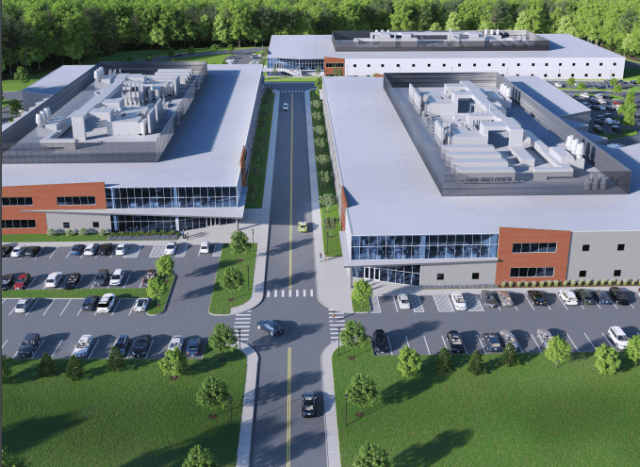
Proposed developments in Boston such as Dorchester Bay City will have to comply with new regulations that seek to minimize the effects of gentrification and racial segregation. Developer Accordia Partners is proposing 1,760 housing units along with 4 million square feet of commercial space at the 34-acre site. Image courtesy of Stantec Architecture
During the lengthy commercial real estate boom, many industry figures said Greater Boston’s diversified economy – with its strengths in financial services, technology and life science – was built to withstand anything except a “Black Swan event” such as a natural disaster or geopolitical conflict.
The unexpected arrived in the first quarter in the COVID-19 pandemic, rapidly separating property sectors into winners and losers. While the pandemic reduced some industries to a shell of their one-time strength, it provided the impetus for growth of overlooked sectors such as distribution centers and biomanufacturing as well as the steady expansion of life science beyond Cambridge’s Kendall Square.
COVID-19 Ravages Retail and Hotel Industries
Greater Boston property sectors had been in a decade-long expansion mode in early 2020, but it only took a matter of weeks for an unchecked pandemic to rewrite the real estate fundamentals.
Government orders to reduce occupancy – and public wariness of indoor dining and shopping – devastated the retail and restaurant industries. More than 4,000 restaurants in Massachusetts have closed during the pandemic, according to the Massachusetts Restaurant Association, representing approximately one-quarter of the statewide industry. Additional closings accelerated in the late fall as the outdoor dining season came to a close.
Although asking rents have yet to decline significantly, many landlords have agreed lease amendments to retain retail and restaurant tenants during the pandemic, said Stephen Pleines, principal at Boston-based brokerage Eastern Land Co.
“It seems like everyone is being as reasonable as they can and trying to make deals happen,” Pleines said. “And for a restaurant landlord to kick a tenant out during this time, it doesn’t make a whole lot of sense unless they have another operator lined up.”
Hotel occupancy rates plummeted despite local colleges’ lease of approximately 1,400 rooms to serve as temporary dorm space and achieve social distancing. The Greater Boston hotel market is on a pace to end the year with a 26 percent occupancy rate, down from 82 percent in 2019, according to Boston-based hospitality consultants Pinnacle Advisory Group.
As scientists including many at Cambridge’s leading pharmaceutical companies raced to develop a vaccine, Boston and suburban office tenants switched to work-from-home models and put off real estate decisions. Many companies in the tech and consumer industries offered office space for sublease. Hit hardest was the Boston central business district, which had 3.8 million square feet of sublease space available by late fall, according to Newmark Knight Frank research, representing 5.7 percent of Boston’s total office inventory and a historic peak.
Suburbs Shake Off Stagnation
After a decade of flat rents and departures of high-profile office tenants to downtown locations, suburban commercial real estate suddenly found a pair of potent new growth drivers in distribution centers for e-commerce and biomanufacturing for Massachusetts’ burgeoning life science industry.
Asking rents for state-of-the-art distribution centers are approaching records in the high teens per square foot range, according to Colliers Boston, as Amazon and other logistics companies seek high-bay warehouse space and last-mile delivery sites near population centers.

King Street Properties’ 700,000-square-foot biomanufacturing development planned for Devens is just one of many speculative life science properties that emerged in 2020. Image courtesy of King Street Properties
“The high-end space goes very quickly and is not staying on the market a long .Everyone is after the new development space and we’re seeing almost all of that lease up before completion or within six months of hitting the market,” said Dion Sorrentino, a research analyst at Colliers.
But logistics providers face rising competition from biomanufacturing developers, including contract manufacturing facilities that provide specialized equipment for testing and production of drug candidates developed in the labs of Kendall Square and Route 128.
Boston-based King Street Properties has plans to build up to 700,000 square feet of biomanufacturing space at Devens, the state-owned business park, while developers and economic development agencies are planning expansion of drug manufacturing sites in Boxborough, Marlborough, Watertown and Worcester.
South Boston Lab Market Grows
Redevelopment of properties along South Boston’s A Street corridor as well as eastern portions of the Seaport District emerged as a major new growth avenue for life science developers. A 263,500-square-foot speculative lab building at 105 West First St. by Tishman Speyer and Bellco Capital landed a full-building tenant in Cambridge-based CRISPR Therapeutics, which signed a lease with base rent starting at $80 per square foot.
Boston Global Investors switched to a lab-ready design for 401 Congress St., where it previously proposed an 18-story office tower on the Massport-owned parcel. And developers including Alexandria Real Estate Industries and Marcus Partners made forays into the eastern side of the Seaport District, acquiring industrial parcels with potential for R&D uses.
Boston Trains an Equity Lens on Development
With a pair of megaprojects set to transform 143 acres in East Boston and Dorchester with up to 16.4 million square feet of development, the city is Boston is adding new requirements designed to address the city’s history of displacement and segregation.
In East Boston, District 1 City Councilor Lydia Edwards extracted concessions from Suffolk Downs developer HYM Investment Group for the project’s 10,000 housing units, citing missed opportunities over the past decade during the Seaport District building boom. The project was approved by the Boston Planning & Development Agency following a marathon virtual meeting in September. HYM agreed to contribute $400,000 toward rental assistance, $5 million for a housing stability fund and creation of 1,430 affordable units between those built on-site and payments supporting other East Boston projects.
In December, the City Council unanimously endorsed a fair housing amendment to the Boston housing code, which requires developers to consider the effects of their proposals on neighborhood gentrification and displacement. The effects are already influencing developer Accordia Partners’ approach to redevelopment of the 20-acre former Bayside Expo Center property and a 13-acre office park on Morrissey Boulevard, including 1,740 housing units.
During community meetings, Accordia Partners Co-Managing Director Kirk Sykes has laid out the development team’s plans to donate $5 million to an anti-displacement fund, likely to support local nonprofits’ down payment assistance programs.
Accordia’s approach reflects the role of housing ownership in racial wealth gaps, which were spotlighted by a 2015 report by the Federal Reserve Bank of Boston that calculated the average net worth of Black Bostonians at $8 and that of whites at $247,500.
“The vast majority of that is coming from real estate, predominantly because we haven’t had participation from people of color in the GI Bill or challenges from redlining,” Sykes said.
For the on-site housing, Accordia has proposed 15 percent affordable units, 2 percent higher than the city’s standard requirement. Affordable units would be reserved for households earning an average 60 percent of the area median income, or $57,150 for a two-person household, compared with the city’s typical requirement of 70 percent AMI.

Steve Adams
A $775M Bet on Downtown Real Estate in Winthrop Square
Capital markets hit pause on major investments in urban office and multifamily development following the onset of COVID-19, amid concerns about high-rise work and living during the pandemic.
Ultimately, it didn’t deter a London investor from making a big bet on downtown Boston’s next skyscraper project: Millennium Partners’ 1.3 million-square-foot Winthrop Center project at 115 Federal St.
Construction financing was jeopardized following the onset of COVID-19 in March, prompting Millennium to switch the residential portion of the tower from 387 condos to 321 apartments. That prompted London-based Cale Street Investments to issue a $775 million construction mortgage to Millennium Partners, enabling the project to resume in October.





